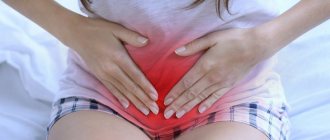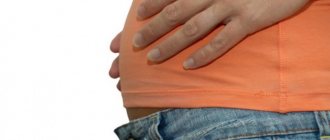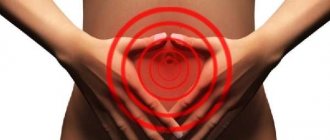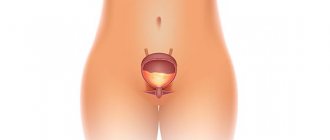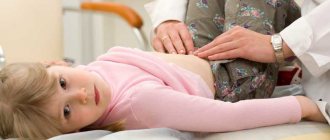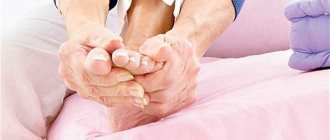Every woman is familiar with the phenomenon of menstruation. Although the principle of this process does not change, the features of the process are different. The discharge can be abundant or scanty, lasts for three days or a week, is painless or accompanied by pain. The intensity of unpleasant symptoms for each woman is individual and largely depends on the structure of the uterus. In addition, menstruation is accompanied by hormonal changes - stress for the body. Menstruation is natural for the body and should cause minimal inconvenience. Few women do not feel unpleasant changes.
Nausea during menstruation: natural phenomenon or disease?
Often, discomfort during menstruation is a consequence of a disease of the female reproductive system. The most common disease is algomenorrhea, menstrual dysfunction. Algomenorrhea appears due to abnormalities in the development of the uterus, inflammation, overwork or mental disorders. When the uterus is displaced, the nerve endings are compressed, which provokes pain in the abdomen and lower back and leads to vomiting.
If the problem is in the structure of the uterus, nausea appears already at the beginning of the first menstruation. In most cases, the disease goes away after the birth of the child, sometimes hormonal treatment is prescribed. Making a diagnosis on your own and self-medicating is prohibited. Algomenorrhea can be caused by endometriosis, inflammation, tubal adhesion after surgery and other diseases.
Be sure to consult a gynecologist if menstruation is accompanied by vomiting, secretion of clots, fever, or severe pain.
Diagnosis and treatment
Diagnosis begins with interviewing the patient, examination and palpation of the abdominal cavity.
After this, the doctor refers a woman with complaints of pain and nausea during menstruation to urine and blood tests, and then to an instrumental examination: ultrasound, computed tomography and magnetic resonance imaging. These activities make it possible to clarify the pathology, distinguishing it from many diseases that have similar symptoms. Therapy is prescribed depending on the established diagnosis. Submucosal nodes and cysts can only be removed surgically; in case of appendicitis, emergency surgical care is required. Fibromatosis at an early stage can be treated with hormonal drugs; at a later stage, surgical intervention is recommended. In most cases, inflammatory processes respond well to antibiotic drug therapy. In order to prevent dysmenorrhea and pathological conditions of the female reproductive organs, young girls are recommended to lead an active lifestyle that prevents stagnation of blood flow in the pelvic area, and to avoid severe hypothermia and stress. Women, in addition, should regularly visit a gynecologist, consulting with him when using contraceptives.
https://youtu.be/8aPwBbFSM1U
If your stomach hurts during menstruation and you feel sick, these are symptoms of many gynecological pathologies. However, not everything is so scary. As practice shows, in most cases we are talking about a completely normal physiological phenomenon. However, in this case it proceeds according to the classical scheme.
3-4 days before the start of the menstrual cycle, mild aching pain begins in the area of the uterus (in its projection, that is, the lower abdomen). They radiate to the sides, iliac regions, and external genitalia. This is fine. During menstruation, discomfort increases and reaches a peak on menstrual periods. Then there is a gradual attenuation of the intensity of the manifestation. If the pain syndrome is extremely intense, especially if it continues between menstruation, this is a reason to be wary.
Why does my stomach hurt and feel nauseous before my period? It's all about desquamation and detachment of the functional layer of the endometrium. Its gradual separation occurs, which leads to nausea and abdominal pain.
In some cases, gynecological pathologies are disguised as menstrual pain. Therefore, it is recommended to undergo regular preventive examinations and consult a doctor at the first sign of discomfort.
https://youtu.be/ZCMk4nOeLzY
Causes of nausea before menstruation
Nausea during and before menstruation is a fairly common condition. It may be a symptom of your period and not cause serious concern. You don’t need to do anything, the bad feeling will go away after your period. However, there is a possibility that the reasons are much more serious and require attention.
Before menstruation, most women experience premenstrual syndrome caused by hormonal changes. PMS is characterized by skin rashes, the stomach swells, and the breasts become swollen and tender. Depression, migraines and lower back pain occur less frequently. All these symptoms are a result of hormone imbalance.
Hormonal pills
Hormonal contraceptives and drugs that affect hormone levels disrupt the balance in the body. Their use before menstruation sometimes causes nausea, emotional instability, and headaches may occur.
Tampons
Using tampons can cause toxic shock, causing nausea, vomiting and dizziness. Associated with the body’s reaction to their composition. Symptoms appear during the first use, tampons should be discarded immediately. Try several types with different compositions and determine which ones are suitable for your body.
Pregnancy
Often the cause of nausea is a frozen or ectopic pregnancy. If your period does not appear on time, you should do a test. Pregnancy should not be ruled out if there is no delay. Scanty discharge, bleeding, accompanied by weakness, poor appetite and nausea are reasons to visit a doctor. If the situation is confirmed, nausea may be a manifestation of toxicosis.
Nausea during menstruation
Almost all the symptoms experienced by a woman during her period are associated with hormonal changes.
Changes in progesterone and estrogen levels are common during menstruation. Due to the amount of hormones in the blood, the blood vessels dilate and the head begins to feel dizzy. Hormonal changes retain fluid in the body, causing swelling and abdominal pain. The breasts swell and increase in size.
On the first day of menstruation, a thick layer of the uterine lining is shed. The body intensively produces prostaglandins, which stimulate contractions of the uterus, pushing out the old layer. The process causes unpleasant sensations: it hurts, pulls in the lower abdomen, and makes you feel nauseous. The amount of gastric juice decreases, and when eating salty, spicy foods, disorders appear.
Nausea is due to increased levels of serotonin in the spinal cord fluid. Serotonin retains fluid in the body - leads to swelling in the skull, possibly dizziness, nausea, loss of consciousness, vomiting.
What are the natural causes of the disorder?
In approximately 70-80% of women, menstruation is accompanied by a significant deterioration in well-being. A number of negative symptoms are observed in the first two days, and then the state of health gradually returns to normal.
In the first days of menstruation, abdominal discomfort is often observed.
A woman complains of:
- dizziness associated with decreased blood pressure;
- nausea caused by the release of certain hormones into the blood;
- breast swelling and increased sensitivity;
- swelling in the abdominal area;
- changes in body temperature;
- skin rashes;
- headache.
Abnormal bowel movements in the form of diarrhea may be present. There is a pulling sensation in the abdomen and lower back. The woman is irritable. The lower extremities swell.
All of the listed symptoms are not a deviation. Often the clinical picture is associated with rapid changes occurring in the body. It is enough just to rest more and lead a correct lifestyle and the condition will return to normal within the next day.
Diarrhea during menstruation
Diarrhea during menstruation is common and goes away after a few days, cleansing the body. Severe and prolonged diarrhea can be alarming - a likely sign of an infectious intestinal disease. When this phenomenon is a new symptom, you should immediately consult a doctor.
If an upset stomach occurs on the first day of your cycle, but your period does not appear, take a pregnancy test. Along with nausea, fever and frequent urination, diarrhea may be part of the body's preparatory work for a normal pregnancy.
If there is no pregnancy, but diarrhea is severe, the cause may be the woman’s diet. During menstruation, the body reacts more sharply to foods that irritate the intestinal mucosa. When diarrhea with vomiting does not stop on the second day, the condition can be dangerous to health. You should not take medications on your own. You should seek help immediately.
To prevent diarrhea from causing trouble during menstruation, avoid new dishes, eat cereals and products made from wholemeal flour. Meals should be divided into portions, and recently prepared foods should be consumed. Drink water.
Could there be pregnancy?
If you feel sick during menstruation, a possible pregnancy cannot be ruled out. In such a situation, critical days are false. In addition to the usual bloody discharge, the woman will suffer from general lethargy and vomiting.
Pregnancy is suspected when there is sudden and severe nausea. Patients for whom the symptom was not previously characteristic should be especially wary. This symptom can suddenly give way to increased appetite - gluttony after menstruation. This is a clear indicator of pregnancy.
When our period arrives, those of us who weren't planning on getting pregnant breathe a sigh of relief, but not everyone feels that same joy. About 5-8% of women remain confused - they vomit during menstruation, and nausea, as is known, is one of the main signs of the conception of a child.
It would seem that if menstrual flow is present, then pregnancy is excluded? Not everything is so simple in the female body. There is a very small chance that you are still pregnant and you need to see a doctor to confirm or refute doubts.
Feeling unwell is always a reason not to postpone a medical visit; in this case, we are talking about responsibility for the baby’s health. There are numerous cases where conception occurred, but the woman did not stop menstrual bleeding.
Pregnancy is the first thing women suspect when sudden nausea occurs. It is after menstruation that the first signs of successful fertilization most often occur, which occurred in the middle of the last menstrual cycle.
The woman must remember when the last sexual intercourse occurred and whether contraception was used. You need to take a pregnancy test. Successful conception cannot be ruled out even with a negative result.
The most reliable way to determine pregnancy:
- undergoing ultrasound diagnostics;
- donating blood for testing.
Appetite often increases during pregnancy
- malaise;
- decreased performance;
- disturbance of sleep and stool;
- absence or, on the contrary, increased appetite;
- the emergence of unusual gastronomic preferences;
- irritability;
- apathy;
- abdominal discomfort.
Body weight may increase. The last period in this case was implantation bleeding, which indicates the attachment of the fertilized egg to the wall of the uterus. Such discharge is similar to critical days, but lasts no more than 3 days and is more meager in volume.
The main reason for the appearance of vomiting after the implantation of the fertilized egg is a sharp increase in the level of hCG. In addition, nausea occurs as a reaction to all strong odors.
If you have early ovulation and your lower abdomen ache 10–14 days after your period, you should think about the possibility of pregnancy. It is on these days that the fertilized egg may attach to the wall of the uterus. A woman may feel, in addition to nagging pain, slight weakness and observe short-term, small-volume bleeding for 1–3 days (implantation bleeding).
If you feel pain in your lower abdomen immediately after your period, this may be the beginning of pregnancy. You need to use a test (modern technologies make them hypersensitive and capable of detecting the onset of gestation at the earliest stages). You can donate blood to determine the concentration of human chorionic gonadotropin (hCG) in a antenatal clinic.
How to get rid of nausea
If abdominal pain and nausea are a regular occurrence during your period, try to prevent their occurrence by following these recommendations:
- Eat right. Eat fresh foods, fruits and vegetables. Do not overload your stomach, avoid fatty foods. Eat foods that contain magnesium and vitamins, such as bananas and avocados. Don't overeat on plums and figs, they increase serotonin levels.
- Stay hydrated. Make sure that water does not linger in the body, this is one of the factors of poor health during menstruation. The level of water in the body affects the pressure inside the skull. Avoid salt and sugar, drink less coffee and tea. Replenish your fluids with drinking water or vegetables and fruits such as watermelon and cucumbers. Water also removes toxins.
- Be active. Exercising outside has a beneficial effect on the body. Biking, swimming and slow walking can help relieve nausea. When moving, the muscles stretch, which eliminates spasms. But heavy loads and visiting the bathhouse should be postponed.
- Relax. Warm water procedures or a heating pad will dilate blood vessels and increase blood circulation.
- Rejoice. A decrease in serotonin levels in the body causes low mood, fatigue and depression. Eat chocolate and do what you love. Do not indulge in foods high in serotonin; excess will cause nausea.
- Get more sleep and recovery. Sleep helps normalize hormone and sugar levels.
- Avoid conflicts. Menstruation is stressful for the body. Worries will make symptoms worse.
Feeling unwell should go away after your period. If nausea during menstruation occurs constantly, and the recommended actions do not alleviate the condition, it is necessary to undergo a full examination and determine the cause.
What to pay attention to
To help yourself in time, you need to pay special attention to the body’s behavior during menstruation. If nausea occurs for the first time, and no pathologies have been previously diagnosed, the condition may indicate the onset of a disease. A woman should be alert to the following symptoms:
- Discharge with a putrid or sour odor, frequent urge to go to the toilet, painful urination, itching of the external genitalia. These signs indicate an infection. If brown daub is present, you should be wary.
- Long, increasing pain in the lower abdomen and heavy menstruation. If you have to change your sanitary pad every 3 hours, you may be bleeding. Significant blood loss is accompanied by dizziness and nausea.
- Fever, increased body temperature, chills, and increased sweating indicate the onset of an inflammatory process.
- Secretion with dark seals or black discharge indicates infectious inflammation. In this case, the woman needs to have a smear test to avoid complications.
If such symptoms are detected, you should urgently see a gynecologist. Any disease can be cured if it is diagnosed in time and the necessary measures are taken.
Why does one feel nauseous during menstruation - the reasons?
Confusion of the uterus is the cause of nausea during menstruation
To answer the question of why you feel sick during menstruation, you should know that nausea as a symptom of menstruation can appear due to the confusion of the uterus. Due to the displacement of the uterus, compression of the nerve endings may occur, which as a result suggests the appearance of a slight feeling of nausea, and in some cases not only nausea, but also vomiting. You should be aware that the displacement of the uterus is accompanied by other painful symptoms, such as lower back pain and pain in the lower abdomen.
If a girl develops uterine deformity, this may also be the cause of nausea during menstruation; such changes are often observed in nulliparous women and teenage girls.
Hormonal OCs (oral contraceptives), birth control pills
Taking hormonal contraceptives or hormonal contraceptive pills may affect the occurrence of side effects from the use of oral contraceptives, such as nausea.
Incorrect selection of hormonal OCs (oral contraceptives) can affect the appearance of painful periods due to changes in a woman’s hormonal background. Frequently, nausea during menstruation can occur in the first months of using hormonal birth control pills.
Serotonin production as a cause of nausea
When a woman's body produces increased amounts of serotonin during menstruation, which is released into the cerebrospinal fluid, nausea may occur. Symptoms of increased serotonin production include not only nausea, but also dizziness during menstruation. The reasons for nausea and dizziness due to excessive production of serotonin is that the normal removal of fluid from the body may be disrupted.
Tampon use during menstruation and nausea
Many types of tampons may contain substances that contribute to the formation of dizziness and nausea, sometimes nausea leads to vomiting. In gynecology, such symptoms when using tampons during menstruation are called toxic shock.
Hormonal changes and nausea
During menstruation, hormonal changes occur in a woman's body. During active hormonal changes during menstruation, compounds are produced that have a negative effect not only on the circulatory system, but also on the muscular system. In gynecology, such compounds are called prostaglandins. Symptoms of the action of prostaglandins can be considered nagging pain in the muscles, deterioration of blood clotting, and spasms in the uterus may appear. This negative effect also extends to the woman’s nervous system, which leads to nausea, which can also lead to vomiting.
Intoxication of the body
Don't forget that common food poisoning can cause severe nausea and vomiting, even during menstruation. Therefore, the option of food poisoning should also be considered, especially if during menstruation you not only experience severe nausea and vomiting, but also pain in the lower abdomen, left or right abdomen, and diarrhea (diarrhea) is observed.
Inflammatory processes in the pelvis
If it hurts on the left or right side after menstruation, it is worth thinking about inflammatory diseases of the reproductive sphere: adnexitis (inflammation of the ovary and tube), oophoritis (isolated inflammation of the ovary), salpingitis (inflammation of the fallopian tube).
Neglect of these diseases will lead to serious complications, in most cases requiring surgical interventions. Therefore, with an increase in body temperature, lethargy and fatigue, menstrual irregularities, if your period has passed, but the lower abdomen still feels tight. It is worth seeking help from a specialist.
What is algomenorrhea?
A diagnosis such as algomenorrhea is usually made by a gynecologist to those women whose periods (menstruation) are always accompanied by nausea, a feeling of nausea, pain in the lower abdomen, when there is severe pain in the lower abdomen, when pain appears in the back. Algomenorrhea is treated with the use of hormonal medications. The disease itself occurs due to a violation of the outflow of blood from the uterine area. This process occurs when the uterus develops incorrectly, is underdeveloped, or is deformed. All of the above reasons for the appearance of algomenorrhea refer to primary algomenorrhea. When a gynecologist diagnoses secondary algomenorrhea, this means that such painful symptoms, nausea and pain in the lower abdomen during menstruation appear due to the development of certain types of gynecological diseases. Diseases that provoke a diagnosis such as secondary algomenorrhea include uterine fibroids, endometriosis, the formation of adhesions in the uterus and many others. If your stomach hurts a lot during menstruation, read the article: pain in the lower abdomen during menstruation, causes and symptoms of what health problems.
Pathological symptoms
They are characteristic of secondary dysmenorrhea, caused by inflammatory and other pathogenic processes in the area of the female reproductive organs. The most common diseases of the female genital area that cause nagging pain in the lower abdomen include:
- Endometriosis is the growth of endometrial tissue in the appendages and uterus. The pathology may be accompanied by brown discharge, pain radiating to the pubis and groin.
- An ovarian cyst that can lead to rupture. In this case, intracavitary bleeding develops, blood pressure drops, sharp pain occurs in the abdomen on the right or left, then spreading to the entire abdominal cavity.
- Cysts, fibroids, adhesions, inflammatory processes of the intrauterine cavity. With these diseases, blood circulation in the pelvic area is impaired, causing pain.
- Submucosal nodes are benign neoplasms growing in the intrauterine cavity. Reaching large sizes, they begin to interfere with the exit of the endometrium, intensifying spasms.
How to eliminate or reduce nausea during menstruation?
Nausea during menstruation can be eliminated only by finding out the exact reasons for the appearance of such a painful symptom, and for this you should visit a gynecologist. If the gynecologist does not detect the presence of any serious problems in the woman’s health, then he can prescribe medications to eliminate the symptoms of nausea, recommend changes in the woman’s daily routine or diet, and identify the causes of nausea, eliminating which can significantly reduce the intensity of unpleasant symptoms.
What to do if you feel sick during your period?
In the case when painful periods are accompanied by nausea and other painful symptoms that do not indicate the development of the disease, you should try not to overwork, do not overexert yourself physically, get enough sleep, be less nervous, do not smoke or drink alcohol during painful periods. And in order to reduce the symptoms of nausea, you should lie down and try to relax, inhaling and exhaling deeply. It is recommended to spend more time outdoors.
Maintaining a daily and sleep schedule, eating right, walking outside (in the fresh air), walking before bed, devoting sufficient time to rest, all this has a beneficial effect on well-being even during menstruation and significantly reduces painful symptoms during menstruation, eliminates nausea and helps avoid vomiting.
It should be remembered that taking medications for nausea that occurs during menstruation should be agreed with the attending gynecologist.
Your doctor may recommend using anti-inflammatory medications during painful periods in the form of ibuprofen or paracetamol if needed. No-spa and spasmalgon can be used to eliminate spasms and pain in the lower abdomen. But the main thing during menstruation to eliminate nausea, pain in the lower abdomen and dizziness is to follow a daily routine, diet, get enough sleep, lead an active lifestyle without bad habits, all this will significantly reduce nausea and pain during menstruation, and in some cases eliminate them altogether.
Similar articles
The body of a modern woman is subjected to serious overload - both physical and psychological - which ultimately affects her menstrual cycle. Almost every second representative of the fair half of humanity is faced with temporary or...
Spotting before and after menstruation If spotting from the vagina occurs during the menstrual cycle, then this is a completely normal process. But, if this happens before and or after menstruation, then such...
Symptoms
The symptoms of the main diseases described can be systematized as follows.
- Pain in the projection of the uterus. Typically of medium intensity. Developed pain syndrome indicates active processes, including purulent ones. Accompanies the patient constantly or almost always. The nature of the discomfort is aching, pulling, burning, shooting. With a purulent lesion, a pulsating, pulsating nature of the pain is possible. Unpleasant sensations intensify during periods of physical activity, when changing body position, or during intimacy. Pain syndrome during the normal course of the process is minimal.
- Menstrual irregularities. It is characterized by dysmenorrhea (severe pain during menstruation), oligomenorrhea (minimal amount of blood discharge) or, conversely, menorrhagia (excessive menstrual bleeding). Possible prolongation of menstruation (opsomenorrhea).
- Nausea. If your stomach hurts and you feel nauseous during your period, you need to look for the reasons among those presented above. Nausea occurs sporadically. This is an alarming manifestation that may indicate a pregnancy that the patient is not yet aware of.
- Changes in fertility patterns. The patient often becomes infertile or cannot become pregnant for a long time. This condition is caused by the underlying pathology.
- Discharge of an uncharacteristic type during menstruation and immediately after it. Usually watery in nature, colorless and odorless. Possible purulent exudate with infectious lesions. With candidiasis, the discharge is white and cheesy.
The symptoms are not specific enough. An objective diagnosis is required to determine the cause of the problem.
Why do you feel sick during your period?
Algomenorrhea is the name given to painful menstruation, characterized by nausea, cramping or aching pain in the lower abdomen or lower back, radiating to the hips and upper legs. This problem occurs frequently. Nausea and dizziness during menstruation are caused by various changes in the body that are necessary for a woman to be able to carry and give birth to a baby normally. To accomplish this task, her body undergoes cyclical changes every month, known as the menstrual cycle, the average duration of which is 28 days.
The main changes during the menstrual cycle occur in the woman's reproductive system. At the same time, they affect the functioning of other organs and systems (digestive, urinary, cardiovascular, nervous). The brain is in charge of restructuring with the help of biologically active substances known as hormones, which are produced by the pituitary gland, located at the base of the main organ of the central system. The menstrual cycle consists of several stages:
- Menstruation or menstrual phase (lasts from 3 to 6 days) . If pregnancy does not occur, the endometrium, the lining of the inner wall of the uterus on which the fertilized egg is attached, is rejected.
- Follicular phase . It begins simultaneously with menstruation and lasts about two weeks. During this period, the endometrium begins to renew itself, and a new follicle matures in the ovaries, inside which an egg grows. When the follicle matures, it actively produces estrogens, the task of which is to prepare the body for ovulation. When the level of these hormones reaches its maximum concentration, the brain orders the egg to leave the mature follicle. It does this by releasing luteinizing hormone (LH), which is produced by the pituitary gland, into the blood.
- Ovulatory phase (ovulation) . A mature follicle ruptures, and a mature egg, ready for fertilization, emerges from it. Within two to three days after ovulation, a woman can become pregnant.
- Luteal phase . The ruptured follicle transforms into the corpus luteum and begins to actively secrete the hormone progesterone, under the influence of which the endometrium begins to prepare for pregnancy and attachment to the mucous membrane of a fertilized egg. If conception does not happen, the corpus luteum decreases in size, reduces the production of progesterone, and after some time disappears, leaving behind a small scar.
Before menstruation
When the body prepares for pregnancy in the second half of the menstrual cycle, premenstrual syndrome (PMS) develops, in which psycho-emotional, vegetative-vascular, metabolic-endocrine (hormonal) disorders occur. Even before the onset of menstruation, this causes periodic pain in the lower abdomen, increased appetite, and mood changes.
During the changes, fluid is retained in the body. Because of this, the mammary glands swell and swell, abdominal pain appears, and the volume of circulating blood increases. The amount of cerebrospinal fluid (CSF), which occupies a tenth of the brain, also increases. It protects the central organ of the nervous system from mechanical influences, maintains constant intracranial pressure, and ensures water and electrolyte homeostasis.
An increase in cerebrospinal fluid causes an increase in intracranial pressure. This is a dangerous condition that can lead to mental disorders, speech disorders, reflexes, coordination, and even stroke. To prevent this, the brain gives an order to get rid of excess fluid. Hence the vomiting and the urge to vomit - nausea on the first day of menstruation or before it, sweating, frequent urination.
An increase in the volume of cerebrospinal fluid is not the only cause of nausea before menstruation. During this period, the amount of the neurotransmitter serotonin, known as the “happiness hormone,” increases. It takes an active part in the transmission of nerve impulses, affecting blood clotting, improving food digestion, and relieving pain. During ovulation, serotonin increases the pressure inside the follicle, which promotes the release of the egg. In addition, the neurotransmitter affects the contraction of the uterus and fallopian tubes during childbirth.
Serotonin is not always beneficial. Due to its increased amount, it can cause nausea during menstruation, since the neurotransmitter is actively involved in digestion, and any disruptions can provoke gastrointestinal disorders. In addition, increased levels of serotonin lead to fluid retention in the body and water intoxication, to which the body reacts with nausea and vomiting. The neurotransmitter affects mood: after strong positive emotions, a decline occurs, depression, anxiety, and headaches develop, which are often accompanied by PMS.
Prostaglandins can cause nausea before and during menstruation. This is one of the types of mediators that transmit signals from the brain to different organs and systems. They are also involved in the menstrual cycle. When menstruation begins, the brain, through mediators, sends the order to the uterus to contract in order to push out the remnants of the exfoliated endometrium.
Unlike hormones, prostaglandins do not have a specific direction. Some of them, instead of moving towards the uterus, enter the nearby intestine, telling it to contract. This leads to defecation, often to diarrhea. For some women, increased bowel activity leads to nausea during menstruation. The activity of prostaglandins is also the cause of pain. The increased level of these substances before and at the beginning of menstruation causes the uterus to actively contract, which is why blood circulation in it is disrupted during severe spasms.
During menstruation
Increased cranial pressure, prostaglandins, and serotonin cause nausea during menstruation, and their influence increases at this time. For example, prostaglandins affect muscle, nervous tissue, and the circulatory system, which is why the muscles in the lower abdomen become hard, blood vessels dilate, and blood clotting decreases. An increased amount of these mediators reduces the production of gastric juice, which is why foods, especially salty and rich in spices, cause vomiting and nausea.
Nausea and vomiting during menstruation can be caused by other reasons. Among them:
- Displacement of the uterus, its slight deformation . During menstruation, the organ enlarges, so even a slight shift back causes compression of the nerve endings, to which the body reacts with nausea during menstruation. The problem is typical for young girls and nulliparous women. In most cases, the problem goes away after the baby is born or with age.
- Taking hormonal birth control pills and medications that affect the level of hormones in the blood. These drugs cause hormonal imbalance, one of the symptoms of which is nausea and dizziness during menstruation, nervousness, and headaches. In addition, medications contain many chemical components that are toxic to the body, to which the body reacts with nausea, trying to get rid of them by vomiting.
- Using tampons . Sometimes toxic shock occurs, caused by poor-quality materials or bacteria, in most cases staphylococci. When these microbes find themselves on the tampon, they begin to actively multiply, releasing poisons that enter the blood through microcracks, causing a state of shock. This is manifested by nausea, vomiting, dizziness, and loss of consciousness. This reaction is associated with improper use of a tampon (for example, staying in the vagina for too long), and an increased concentration of staphylococci in the body.
- Pregnancy . For some women, periods do not disappear in the first months of pregnancy, which is manifested by nausea, scanty discharge, and poor appetite.
- Ectopic pregnancy . Although the egg was fertilized, it was not implanted in the endometrium, but on the fallopian tubes. As the fetus grows, it will cause them to rupture, which can be fatal. The only way out is abortion.
- Inflammatory processes in the reproductive system.
- Pathological causes . Diseases of the digestive, cardiovascular, endocrine, nervous and other systems can worsen during menstruation, manifesting themselves with nausea and vomiting.
- Physical strain during menstruation.
What can be accompanied by nausea during menstruation?
Painful periods are not only caused by nausea. Menstruation may be accompanied by the following symptoms:
- migraines;
- spasms, pulling, cramping pain in the lower abdomen, lower back, hips;
- pale or red skin;
- increased temperature (hyperthermia);
- bloating, increased gas formation;
- excessive sweating;
- rashes on the skin of the face;
- anxiety, nervousness;
- weakness;
- insomnia;
- diarrhea (diarrhea), vomiting;
- increased sensitivity to odors.
Dangerous symptoms
It is necessary to urgently consult a doctor if the discomfort causes suffering and does not go away after the end of menstruation. You should be alert to abundant, strong and prolonged discharge, temperature, chills, fever, severe itching, pain and pain when urinating. This may signal serious pathological processes. For example:
- Heavy discharge during menstruation may indicate uterine fibroid - a benign tumor on its outer or inner wall. In this case, menstruation is accompanied by severe pain, which is caused by inflammation or pressure of the tumor on the uterus. To eliminate the problem, you need to undergo examinations, after which the doctor will decide whether surgery is necessary.
- Persistent nagging pain in the pelvic organs may indicate infection of the ovaries, fallopian tubes, and bladder. The main cause is bacteria, including chlamydia (causes chlamydia), gonococci (cause of gonorrhea). After determining the cause of infection, the doctor prescribes antibiotics aimed at combating pathogenic bacteria. Ignoring the problem can cause infertility, so you should definitely pay attention to the unpleasant odor and unusual color of discharge (black periods).
- Sharp pain in one side. It is possible for the ovary to twist, which leads to difficulty in blood circulation (among the causes is a cyst). Urgent medical intervention is necessary, otherwise the pathology will lead to the extinction of ovarian function.
- Severe cramps that are not relieved by regular painkillers, heavy and prolonged bleeding, and pain during sex may indicate endometriosis. With this disease, endometrial cells grow and extend beyond the uterus. If the disease is not treated, it is difficult for a woman to become pregnant, in some cases it is impossible.
- Severe pain during menstruation can be a consequence of the installation of intrauterine contraceptives. In this case, it takes time for the spiral to take root in the body. If the pain continues for a long time or appears suddenly after the intrauterine device has been installed for a long time, you need to do an ultrasound to determine what condition it is in. May need to be corrected.
- Abdominal pain, nausea, and vomiting are often accompanied by the development or exacerbation of diseases of the digestive system.
Dizziness and nausea during menstruation may indicate not only problems of the reproductive system. Anemia can provoke algomenorrhea when the level of hemoglobin in the blood decreases due to blood loss. This leads to oxygen starvation, increased heart rate, impaired taste and smell. Cervical osteochondrosis leads to impaired blood supply to the brain. During menstruation, the situation worsens due to tissue swelling, compression of nerve endings and blood vessels in the area of the vertebrae. This is manifested by dizziness, nausea, and vomiting.
Low glucose levels during menstruation cause nausea and vomiting in diabetic women. During this period, blood sugar decreases and complications may arise if the patient does not comply with the dosage, time of insulin intake, diet, or drinks alcoholic beverages. Due to the low amount of glucose, it can cause nausea during menstruation in the absence of diabetes, if a woman is involved in a strict diet, fasting, or has problems with the adrenal glands or pancreas.
Help with severe pain
The first thing a girl should do when experiencing sharp pain is to relax. It is advisable to lie down and provide your lungs with fresh air. You should take a pain reliever. When, in addition to nausea, there is an increase in temperature, it is necessary to reduce it using anti-inflammatory drugs. For pain, take antispasmodics - tablets that reduce muscle spasms, or analgesics.
If nausea persists, the gynecologist may prescribe a drug to balance hormonal imbalances during the menstrual cycle. This period is characterized by low blood clotting, operations are prohibited.
If a woman did not experience discomfort during menstruation, or the pain began suddenly, consultation with a specialist is necessary. The doctor will order tests and determine the cause.
Cramping and aching pain in the lower abdomen, nausea, chills, dizziness, fever - these symptoms often accompany a woman on the first day of her period. These signs may appear before the onset of menstruation, and last until the end of the discharge. This condition causes discomfort, knocks you out of your usual rhythm, and makes you worry: unpleasant symptoms can be either commonplace or warn of serious problems.
How to eliminate unpleasant symptoms during menstruation
If your period is constantly accompanied by dizziness, vomiting, nausea, high fever and other unpleasant symptoms, you should consult a doctor and undergo an examination. Based on the data obtained, the doctor will prescribe therapy, which includes the following treatment methods:
- taking medications;
- surgery;
- physiotherapy.
At home, applying a heating pad, bags of heated sand and salt, or special warming patches to the abdominal area will help reduce pain and relieve nausea. Heat will dilate blood vessels, improve blood circulation, reduce uterine tone and swelling. The heating pad for procedures should be warm, not hot under any circumstances, otherwise the heat can cause skin burns and stimulate inflammatory processes present in the body.
Drugs
Before taking medications for pain and nausea, you should consult your doctor, otherwise serious health problems may occur. The following drugs will help relieve painful symptoms and stabilize:
- Metoclopramide is a serotonin receptor blocker that relieves nausea and pain. It is characterized by antiemetic properties, eliminates nausea, hiccups, relieves headaches, accelerates gastric emptying without causing diarrhea.
- Ibuprofen is an anti-inflammatory drug, analgesic with analgesic and antipyretic properties. Suppresses the synthesis of prostaglandins.
- Drotaverine . Antispasmodic, relaxes muscle tone, dilates blood vessels, reduces blood pressure.
The course of therapy may include taking medications to normalize hormonal levels. Among them are homeopathic remedies, the active ingredients of which are herbs:
- Remens tablets or drops . The drug reduces pain during menstruation, normalizes the amount of blood loss, and reduces the symptoms of PSM. Take 10 drops or 1 tablet three times a day for 1–3 months (the duration of the course is prescribed by the doctor).
- Vitokan drops . They normalize hormonal levels, increase immunity, promote the resorption of tumors, have anti-inflammatory properties, and are relevant for mastopathy (pathological growth of breast tissue). Take 30 drops per day for a month.
- Mastodinon . Reduces the manifestations of PMS, pain during menstruation, reduces swelling of the mammary glands, inhibiting the production of the hormone prolactin, which prepares the mammary glands for feeding the baby, and has a positive effect on the balance of sex hormones. Take 30 drops 2 times a day for the period specified by the doctor.
Sedatives will help stabilize the emotional background, remove nervousness and tension. Among them:
- Motherwort tincture . Reduces stimulation of the nervous system. It has no hypnotic effect, but improves sleep. Does not cause psychological dependence or addiction. Drink 30–50 drops 3–4 times a day for the period specified by your doctor.
- Valerian tincture . Characterized by a sedative, antispasmodic effect. Reduces the excitability of the central nervous system, slows the heart rate, dilates coronary vessels, improves the functioning of the digestive system. Apply 20-30 drops three times a day until a stable result is achieved.
- Persen . A herbal preparation with sedative and antispasmodic effects, relieves nervous tension. Take 2-3 tablets three times a day.
Prevention
In order not to suffer from algomenorrhea, to minimize the manifestations of PMS, it is necessary to follow the rules of a healthy lifestyle. For this purpose, you must perform the following actions:
- Eat properly. The diet should include fruits, vegetables, and foods rich in magnesium and vitamins. For this purpose, it is useful to eat bananas and avocados. You should avoid fatty, fried foods, which negatively affect the functioning of the digestive tract and other systems.
- Maintain water balance. It is necessary to avoid factors that cause swelling: reduce the consumption of salt, sugar, coffee, tea. You need to replenish fluid in the body with simple drinking water, vegetables, fruits (cucumbers, watermelons).
- Lead an active lifestyle and play sports. Moderate loads strengthen the body, make muscles more mobile, and eliminate muscle spasms.
- Avoid overwork, take care of proper rest and sleep.
- Give up alcohol and cigarettes.
- Avoid conflicts and stressful situations.
- Be more happy. Low levels of serotonin cause disruptions in the functioning of the nervous system, depression, and fatigue. Chocolate, plums, and figs will help stimulate the production of serotonin, but you should not get carried away with them, since an excess of the neurotransmitter is dangerous for health.
- If you have symptoms indicating the development of pathological processes, you need to consult a doctor and undergo treatment if a disease is detected.


